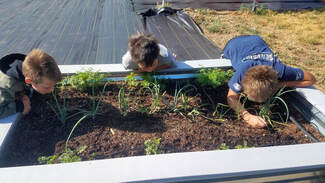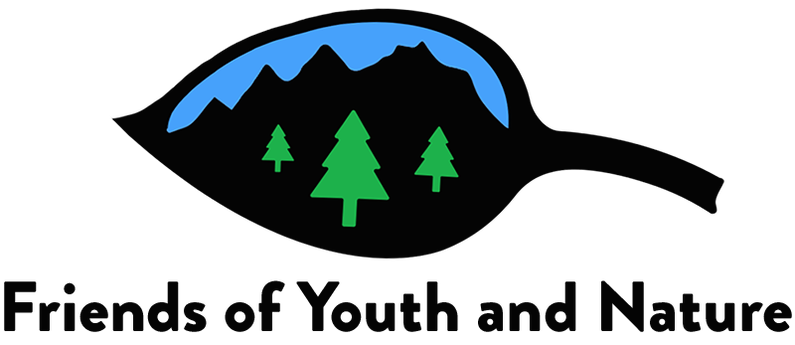|
Tips to help you connect your family to nature!
|
|
Sniffing around the garden! Students from Delta Country are enjoying the organic smell of soil and herbs in their school garden. The sound of leaves crunching as you walk through the forest, the feeling of the warm sun on your face, the sight of a mule deer, the smell of a nearby campfire, and the taste of a freshly picked tart apple engage our five senses − sight, hearing, smell, taste, and touch. Together these senses help us get a clear picture of what is happening around us.
Have you ever taken a whiff of some smell that transported you back to a childhood memory? Maybe the smell of basil makes you think of your grandmother’s garden, or the smell of a campfire makes you think of a memorable camping trip. Does the smell of freshly cut grass or alfalfa confirm that summer is here? What smells remind you of autumn − the pungent organic smell of decomposing leaves in the forest, the fresh, moist scent of an oncoming snowstorm or the smell of roasted chili peppers? Smell is an intriguing sense because of its wiring in our brains. Scents stimulate our olfactory cells, travel on a fast track through our brain’s superhighway of connectivity, and bypass the brain’s switchboard (the thalamus). Smell stimuli go directly to the region of our brain (hypothalamus) involved in detecting threats and stress responses, and hormones are quickly issued to the appropriate places. By going directly to this brain region, our body responds faster to smells, according to Johan Lundström, a neuropsychologist at the Karolinska Institute in Sweden (The Scientist: exploring science and inspiring innovation). Certain smells can quickly trigger a physical reaction within us. For instance, smells can make us feel sick or warn us of danger (fire), or can make us feel hungry if we smell something yummy. Smell signals also go directly to another region of the brain called the hippocampus, which is responsible for forming and recalling memories. A sense of smell is the only fully developed sense a fetus has in the womb, and it is the one that is the most developed in a child until the age of around 10, when sight takes over. A prominent aroma researcher explained that because smell and emotion are stored as one memory, childhood tends to be the period in which you create the basis for smells you will love or hate for the rest of your life. And, like so many things in life, the sense of smell is impacted by aging. Although the cells that make up the olfactory system are replaced as they age and die, just like any cell, the rate of replacement slows after 50 years of age. To keep that keen sense of smell as you age, your olfactory cells need regular workouts, in terms of exposure and variety. It’s a “use it or lose it” kind of thing. Have you ever felt more calm or relaxed when you breathed in the wonderful smells of a pine forest or the fragrant smells of a flower garden? Studies have also shown that the smells of nature are linked to lower physiological stress (The Scientist: Exploring Life, Inspiring innovation). Even though the sense of smell for adults often operates in the background behind other senses, natural odor stimuli has a swift and direct effect on our parasympathetic system, the processes that allow us to rest and digest. It has the greatest impact on lowering blood pressure and other physiological stress reduction factors. Our noses can distinguish more than 1 trillion scents, according to new research by the National Institute of Health. The findings show that our sense of smell is far more sensitive than previously thought. You and your children take in many different smells every single second of every single day. How often do you really consider what you smell, especially while you are exploring the great outdoors with your children? Here are a few suggestions on how to get your kids to use their noses in nature:
0 Comments
|
Blogs for Summer! DIY Summer Camps A Summer backyard Bucket List Hiking with Children 101 Kids, Dogs and Hikes a Winning Combination Getting Outdoors is Easier than You Think Categories
All
Archive
Archives
July 2024
|



 RSS Feed
RSS Feed


